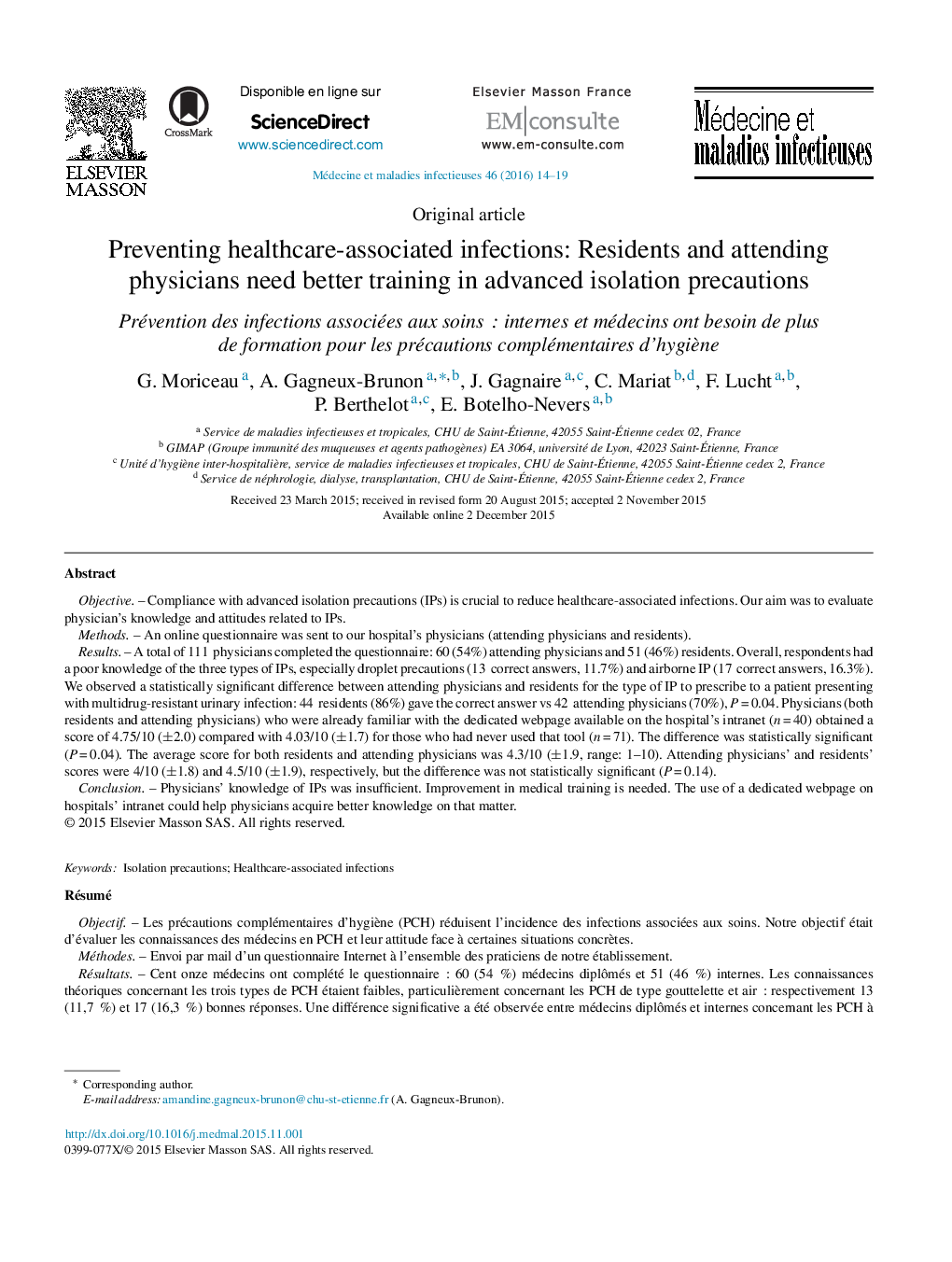| کد مقاله | کد نشریه | سال انتشار | مقاله انگلیسی | نسخه تمام متن |
|---|---|---|---|---|
| 3412503 | 1224228 | 2016 | 6 صفحه PDF | دانلود رایگان |
ObjectiveCompliance with advanced isolation precautions (IPs) is crucial to reduce healthcare-associated infections. Our aim was to evaluate physician's knowledge and attitudes related to IPs.MethodsAn online questionnaire was sent to our hospital's physicians (attending physicians and residents).ResultsA total of 111 physicians completed the questionnaire: 60 (54%) attending physicians and 51 (46%) residents. Overall, respondents had a poor knowledge of the three types of IPs, especially droplet precautions (13 correct answers, 11.7%) and airborne IP (17 correct answers, 16.3%). We observed a statistically significant difference between attending physicians and residents for the type of IP to prescribe to a patient presenting with multidrug-resistant urinary infection: 44 residents (86%) gave the correct answer vs 42 attending physicians (70%), P = 0.04. Physicians (both residents and attending physicians) who were already familiar with the dedicated webpage available on the hospital's intranet (n = 40) obtained a score of 4.75/10 (±2.0) compared with 4.03/10 (±1.7) for those who had never used that tool (n = 71). The difference was statistically significant (P = 0.04). The average score for both residents and attending physicians was 4.3/10 (±1.9, range: 1–10). Attending physicians’ and residents’ scores were 4/10 (±1.8) and 4.5/10 (±1.9), respectively, but the difference was not statistically significant (P = 0.14).ConclusionPhysicians’ knowledge of IPs was insufficient. Improvement in medical training is needed. The use of a dedicated webpage on hospitals’ intranet could help physicians acquire better knowledge on that matter.
RésuméObjectifLes précautions complémentaires d’hygiène (PCH) réduisent l’incidence des infections associées aux soins. Notre objectif était d’évaluer les connaissances des médecins en PCH et leur attitude face à certaines situations concrètes.MéthodesEnvoi par mail d’un questionnaire Internet à l’ensemble des praticiens de notre établissement.RésultatsCent onze médecins ont complété le questionnaire : 60 (54 %) médecins diplômés et 51 (46 %) internes. Les connaissances théoriques concernant les trois types de PCH étaient faibles, particulièrement concernant les PCH de type gouttelette et air : respectivement 13 (11,7 %) et 17 (16,3 %) bonnes réponses. Une différence significative a été observée entre médecins diplômés et internes concernant les PCH à appliquer pour infections urinaires à germes multi-résistants : 44 bonnes réponses (86 %) chez les internes contre 42 (70 %) chez les médecins diplômés (p = 0,04). Les praticiens qui connaissaient l’outil mis en place par l’unité d’hygiène sur l’intranet de l’établissement (n = 40) ont obtenu une meilleure note que ceux qui ne le connaissaient pas (4,75 ± 2/10 vs 4,03 ± 1,9/10, p = 0,04). La note moyenne de l’ensemble était de 4,3 ± 1,9/10 (de 1 à 10). Les médecins diplômés ont obtenu une moyenne de 4 ± 1,8/10 et les internes de 4,5 ± 1,9/10, sans différence significative entre les groupes (p = 0,14).ConclusionLa connaissance des praticiens en matière de PCH est insuffisante. Des améliorations en termes de formation sont nécessaires. Les outils dédiés aux PCH sur l’intranet des établissements pourraient permettre une amélioration de leur prescription.
Journal: Médecine et Maladies Infectieuses - Volume 46, Issue 1, February 2016, Pages 14–19
